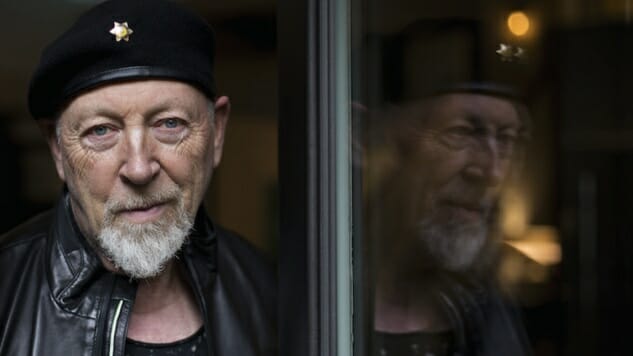The Curmudgeon: How an English Song about an English Motorcycle Became an American Classic
Richard Thompson's "1952 Vincent Black Lightning"
Photo by Tom Beygrowicz
When Richard Thompson performed at Delfest in May, he confronted the dilemma he faces at almost every show: How long can he ignore the calls from the audience for his best known song, “1952 Vincent Black Lightning,” before he gives in and plays it? On that warm afternoon in western Maryland, he gave in early and played it halfway through the set.
Performing solo-acoustic at the big outdoor stage within the racetrack on the north bank of the Potomac River, Thompson said, “I’d like to thank Del McCoury for popularizing this song in the United States. He sang some different words,” Thompson added with a cryptic smirk, “but that’s okay. This, however, is the only version of the song you’ll hear today in B-flat.”
That was a veiled hint that the songwriter would be returning to the same stage later that evening to sing the song with the festival’s namesake for the first time ever. It would be a landmark performance. McCoury, who has dominated 21st-century bluegrass in both awards and reviews, had taken this British musician’s song about a British motorcycle and British geography and made it a favorite of bluegrass and Americana audiences across the ocean. And in that trans-Atlantic journey is a lesson about songwriting.
Thompson, a huge fan of older American music, had deliberately set out to write a song about an outlaw who rides a motorcycle rather than a horse—and to make the story as British as possible. The motorcycles mentioned aren’t American models but British: Vincents, Nortons and Greeves; the only place name in the song is Box Hill, a summit in Surrey’s North Downs and a popular cycling destination. McCoury changed the journey’s destination to Knoxville, but he left the names of the motorcycles alone—Harleys are never mentioned—and yet the song has become a bluegrass classic.
“It’s important to make music that incorporates elements from where you come from,” Thompson added, “so you’re contributing something of yourself into the music. If you’re from England and you’re writing about the Mississippi Delta, there’s something missing. You can be a good imitator, but what are you bringing to the process? The early British Invasion bands really came to life when they stopped doing covers of American songs and started doing original tunes.”
It’s one of the counterintuitive truths about popular music that the more local and particular you make a song, the more likely it is to sound universal. Listeners identify with a song because of its details, for we don’t live our lives in vague generalities but in nitty-gritty specifics.
It doesn’t matter if the details in the song are the listener’s details or not; what matters is that the song reflects a life lived in someone’s particulars. Maybe you didn’t shoot a man in Reno just to watch him die, but you certainly feel regret for some similar, singular sin. Maybe you never rode a 1952 Vincent Black Lightning—maybe you’d never even heard of that make of motorcycle before—but surely you’ve had some specific possession that meant the world to you.
“’Vincent’ started with the frustration of coming from Britain and wanting to reflect British culture,” Thompson told me in 2001. “It’s hard to find mythological elements from my lifetime to build a song around, because American culture has been so dominant. The mythical places are Laramie and Cheyenne. ‘Going Back to Lancaster’ doesn’t have the same ring to it.”
When McCoury’s sons Ronnie and Rob brought their father the song and suggested he record it, Del hadn’t heard it. But, as it so happens, he was old enough to remember a time in the 1950s when British motorcycles were all the rage in America before the homegrown models took over. And he recognized a good story tied to a good tune when he heard it. All the Briticisms in the tale didn’t make it sound alien; they made it sound lived-in.
“I used to ride motorcycles myself,” McCoury remembers. “I had a 1947 Indian Chief. ‘Vincent Black Lightning’ wasn’t your average bluegrass tune, so that attracted me to it. You get tired of the same old train of things. I’m always looking for something different in a melody, a story or the changes. I like a challenge. There are so many chord holds in that song that I could never do it without my band. Whenever I try it with anyone else, it’s a train wreck.”
-

-

-

-

-

-

-

-

-

-

-

-

-

-

-

-

-

-

-

-

-

-

-

-

-

-

-

-

-

-

-

-

-

-

-

-

-

-

-

-








































